Nancy Boykin: An Interview with One of Philly Theatre’s Leading Lights.
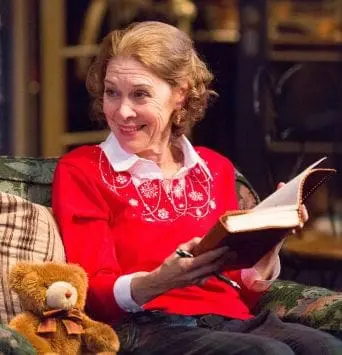
Boykin as Meris Katherine Graven in John
Meet Nancy Boykin, an actress who has stolen stages across the country for more than 30 years. Boykin has made a career in Philadelphia performing at the Wilma Theatre, Theater Horizon, Flashpoint, and at the Arden Theatre Company. She has taught theatre at Villanova University, Cal State Fullerton, the American Academy of Dramatic Arts, and Temple University. She is also a supporter of PlayPenn, a conference devoted to the development of new plays. Keep scrolling to learn about her career and roll in Annie Baker’s newest play John!
Tell us a story about the beginning of your career. Your first audition, your first show, etc.
I entered undergraduate school at the University of Richmond, in Virginia, I intended to major in Mathematics and Piano. That plan lasted about one semester. I dropped the Math major when I bumped up against Physics, I couldn’t make AC/DC currents make sense and got my first ‘C’ ever. I’d always loved music and was a decent pianist, but sitting in a practice room for hours turned out to be much too solitary. I turned to English Literature and had the privilege of taking a Dramatic Literature course. The professor excited us by linking our reading to live performances, and I was hooked. Shortly thereafter I auditioned for a production of Six Characters in Search of an Author – I only had a few lines, but I was so enthralled with the play and the process that I came to every rehearsal, whether I was needed or not, just to watch.
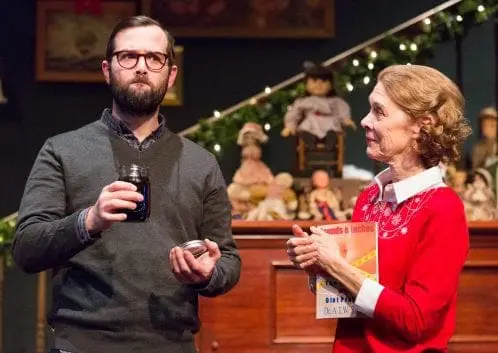
Boykin and Kevin Meehan as Elias Schreiber-Hoffman in John
I had the good fortune of being cast in a production of The Sign in Sidney Brustein’s Window in my final year at Richmond and a director from the Arena Stage in DC came down to guest direct for a few days. My character, Iris, needed to lash out in the play, using a few ‘choice’ words to do so. Being a ‘good’ Southern girl, I apparently was not making those words very believable. So, he asked me to stand on the edge of the stage and ‘let him have it’ over and over until I was so frustrated and angry with him that the words finally became truthful. Ironically, my first professional job was at the Arena Stage in an ensemble role in Once In a Lifetime and my first professional touring job came from that same director who had tortured me in college.
Certainly, one of my more memorable audition stories came shortly after I received my MFA in Acting at the University of North Carolina and had just arrived in New York City. I was doing all kinds of jobs to pay the rent – temp work at Newsweek and in law offices, working on audition material in my spare time. I got called in by the Public Theater for a production of Henry V in Central Park – presumably because I had sent them a card from graduate school the year before. I came into the audition prepared with a piece from The Winter’s Tale and expected to be seen by some casting assistant. I was ushered into the very large stage space at the NY Shakespeare Festival and sitting two rows from the back was Joseph Papp –an icon at that time. He was directing. My piece went well and he asked me to sing – not expecting this, I sang ‘Swing Low Sweet Chariot’ – an old spiritual.
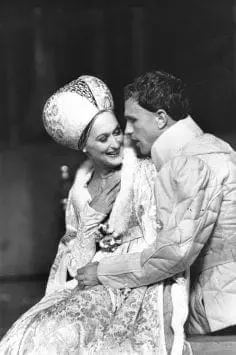
Meryl Streep and Paul Ryan Rudd in Henry V
I returned to my ‘temp’ office and late in the day checked my answering service – please call the Shakespeare Festival. The casting director said “We would like to offer you an ensemble role in Henry V and to be the cover for Meryl Streep in the role of Katharine. I had just seen this Meryl Streep in Twenty-Seven Wagons Full of Cotton and thought she was excellent. I excitedly said “Thank you so much” and was about to hang up when the casting director said, “Don’t you want to know how much you are getting paid?” I walked home from the law office job to my studio on 76th Street, New York suddenly looked like Oz and the sidewalks no longer felt like hot concrete on my feet. I was floating.
Was there a point in your career that you considered changing paths?
Oh yes!!! Many times. Probably the major impetus for thinking about a change was the exhaustion of trying to maintain an acting career while working at ‘job jobs” to pay the rent and raise a son. I think, too, that there are times when we, as artists, begin to believe that our work is getting tired and mediocre, that it isn’t growing, or we see a performance that is so humbling that we want to throw in the towel. I did find that teaching became a great supplement to my acting work and made it easier to say ‘no’ to certain theater opportunities. What else would have interested me? Well, art and music, had I had the talent for it, but I have learned that I should probably stick to looking at paintings and listening to music rather than trying to do it myself.
What was the high point of your career?
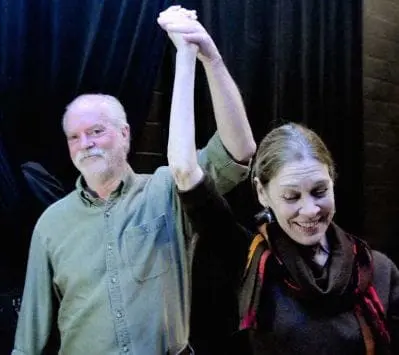
Boykin and her husband, Dan Kern
I would probably have to say working on Sean O’Casey’s beautiful anti-war play Juno and the Paycock, directed by my husband, Dan Kern. It was an inspired production, done is a small space at the Interact Theater in Los Angeles. The wooden floor of the set, the well-worn costumes and the sausages cooking on the open fireplace created a very real world for the audiences and the beautiful language of the play was very accessible in the small theater. The production received critical notice and both Dan and I were nominated for the LA Drama Critics Circle Award. We dressed up for that evening and were thrilled to both receive the awards together that night.
How have you seen roles for women change since you began acting?
Probably the biggest change in ‘roles’ for women has come from the fact that there are more female playwrights now than there had been when I started out. And these writers are creating roles for women who are stronger, more diverse and sometimes more controversial – all good things. Certainly we are seeing more individual and complex female characters and moving away from the ‘girl next door’ and ‘the ditzy blond’. Writers such as Annie Baker, Gina Gionfriddo and Sarah Ruhl are working to find a voice for complicated and fully realized female characters.
Why Philadelphia? Why have you stayed here for so long?
Actually, unlike many of the actors I know in Philadelphia, I haven’t been here that long – since 2000. My early career took me to Washington, DC, then New York (and many regional theater jobs elsewhere), Los Angeles and finally, Philadelphia. We have stayed here because the city has such a wonderful theater community, so many and varied professional theaters, has a thriving inner city life and is just a very ‘real’ place – it is certainly not LaLa Land. Dan and I appreciate the diversity of the city, we enjoyed our years of teaching at Temple University where the students and faculty were exceptional and were happy to find a place where our son could go through the public school system.
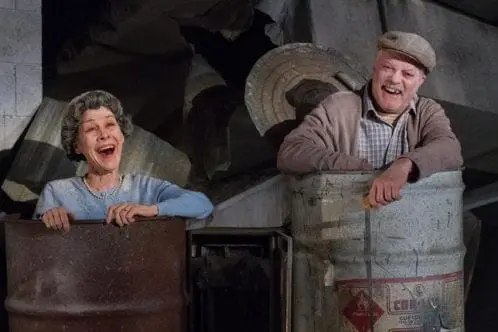
Boykin and Kern in Endgame at the Arden Theatre Company in 2013
In John, there is a strong presence of female identity and struggle. What have you latched on to? What part of this story do you think is most important for representing women onstage?
John is a remarkable play in so many ways – one being that there are women from three generations sitting on the stage together sharing their truths and bouncing off of each other. Probably the section I most appreciate is Genevieve’s wonderful monologue to the audience. It is clear that this is a woman who struggled through a terrible marriage and who was repressed by a domineering husband. She is now beyond that and has found a way to ‘stand in the center of her own universe’. What a victory that is – not just for women, but for everyone. And Mertis, too, has moved beyond the ‘bad dream’ of her first marriage. She is now able to live her own life, to reach outward to be a ‘giver’ and take ownership of her own eccentricities. These two women are happy sitting in the universe.
How do you connect to Mertis? What about her is similar to you?
Having been raised in the South, in a rather conservative environment, there are a lot of things I feel belong to me that also belong to Mertis. I grew up around many women who were ‘givers’ and who knew how to be a good hostesses. They were also positive spirits – trying to keep conversations and interactions positive, rather than negative. I feel my mother’s presence in the role. Every time I come down the stairs at the beginning of the play I feel my mother’s rushed step to open the door to visitors. I’m not sure that I as eccentric as Mertis, but my husband says I am.
Mertis and Genevieve have a deep, trusting relationship. Has it been easy to recreate that with Carla Belver?

Boykin and Carla Belver as Genevieve Marduk in John
What a joy it has been to be able to work with Carla. I have admired her work for years, but this has been
our first time doing a play together. For me, there was an instant connection. Carla is so open and truthful about herself and so honest in creating Genevieve that this has been one of the easiest connections to access in the play. And I feel certain that as a result of our work together and sharing the dressing room, we will be friends for life.
What does it mean to you to have a show with two older women being represented on stage?
Carla and I have both commented on what a joy it is to be working on a play with two older women –because it happens so seldom. I mean, how many times can you do Arsenic and Old Lace or Mornings at 7? So, playing our longtime friendship, our shared secrets, the mysteries that we understand as older (possibly wiser) characters is refreshing. I think I’ve been close to death about 6 times in plays in Philadelphia – it is wonderful to working on a hopeful, spiritual character who is positive and, yes, very much alive!
Mertis asks “Do you ever feel watched, Jenny?” Have you ever felt watched?
This is a tough question to answer simply. I wouldn’t be able to say that I feel ‘watched’ in the traditional sense and I surely wasn’t watched by objects or dolls. But I have felt the presence of those who have gone, encouraging and maybe comforting me. I’ve felt a mystical presence standing in a stone circle in Ireland and while walking on the stones near the ancient Anasazi dwelling in Bandelier, New Mexico. Fortunately, I don’t feel watched by any negative, controlling forces – and if I ever did, they no exist for me. Aren’t I lucky – standing in the center of my own universe?
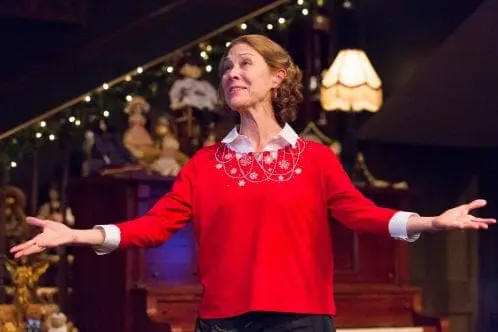
Boykin in John

